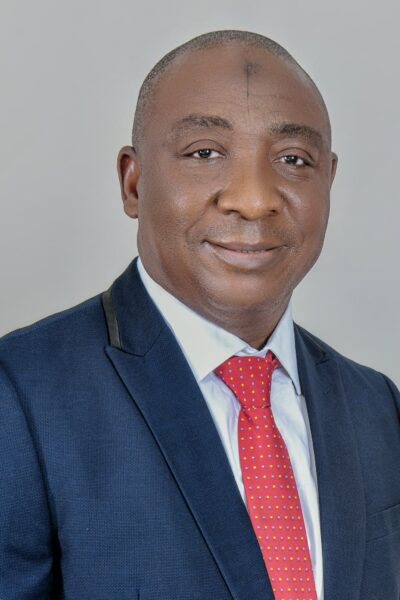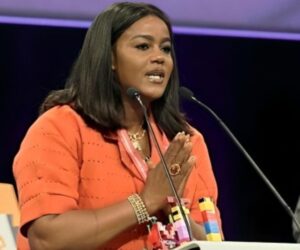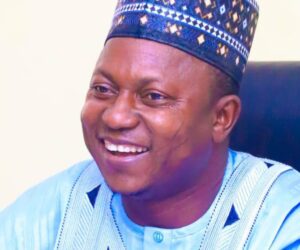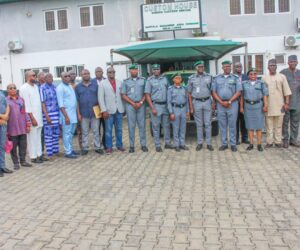1
President of the Nigeria Football Federation (NFF), Alhaji Ibrahim Musa Gusau, has reaffirmed the Federation’s total commitment to the transformation and sustainability of women’s football in Nigeria, declaring that the time has come to reposition the Nigeria Women Football League (NWFL) as a truly professional and commercially viable product.
Gusau, who was represented by the Chairperson of the NFF Women’s Football Committee, Ms. Aisha Falode, made the remarks while delivering his welcome address at the 2025 NWFL Annual General Assembly held in Port Harcourt, Rivers State.
The NFF President described the Assembly as “a defining moment of reflection, dialogue, and shared commitment to strengthen the future of the women’s game in Nigeria.”
He commended the Nigeria Women Football League, club administrators, coaches, players, and partners for their collective sacrifices in sustaining the women’s football ecosystem, while also appreciating the Government and people of Rivers State for their continued support toward sports development and for hosting the year’s congress.
Consistency, Structure, and Player Welfare Key to Progress
Addressing stakeholders, Gusau emphasised the urgent need for reforms in three key areas, calendar consistency, infrastructure development, and player welfare, describing them as critical to the professionalization of the league.
“A professional league must operate within a structured framework that allows clubs to plan, sponsors to invest confidently, and fans to engage continuously. Consistency is not a luxury; it is the lifeblood of professionalism,” he said.
He lamented the infrastructural challenges facing several league venues, calling for improved playing surfaces, lighting, and spectator facilities to enhance match quality and fan experience.
Gusau also decried cases of unpaid wages and poor welfare among players, stressing that such situations “diminish the dignity of the game.” He announced that the NFF is taking decisive steps to address the matter through a National Minimum Wage Structure for registered players, to be monitored by the NFF Compliance Unit, alongside the introduction of mandatory insurance policies for all players.
Women’s Football Is an Economic Product, Not a Charity Project
The NFF President called for a paradigm shift in how women’s football is perceived and managed in Nigeria, urging stakeholders to begin seeing it as a powerful economic and entertainment product with vast commercial potential.
“Women’s football must no longer be viewed as a charity project or a mere social cause. It is a powerful economic and entertainment product capable of attracting massive investment, creating jobs, and projecting Nigeria’s soft power globally,” Gusau noted.
He outlined plans to reposition the NWFL as a commercially attractive brand through data-driven marketing, governance reforms, and partnerships with sectors such as telecommunications, banking, and consumer goods.
Youth Development and Coaching Standards to Be Strengthened
Gusau also announced that the NFF would work closely with the NWFL to strengthen youth development, insisting that every league club should maintain U-15 and U-17 feeder teams to ensure a continuous talent pipeline into the national teams.
He added that the NFF, through its Technical and Development Department, will support the establishment of standardized coaching and scouting programs that leverage technology for player performance tracking and talent identification.
“Every head coach in the NWFL must hold at least a CAF B License. Our players deserve world-class technical guidance, and our league deserves a technical reputation that commands respect,” he added.
Reform Requires Unity and Collective Will
Gusau acknowledged that the ongoing reform agenda for the NWFL would only succeed through shared ownership and joint responsibility among all stakeholders.
He called on the NWFL, to enforce professionalism and discipline, club owners to uphold transparency and accountability, and the media to continue amplifying the league’s progress with fairness and pride.
“If we work together, with unity of purpose and strength of conviction, we will build a Nigeria Women Football League that not only nurtures world-class players but also stands as a model of professionalism, governance, and commercial success in Africa,” Gusau affirmed.
He concluded by urging delegates to engage sincerely and deliberate constructively throughout the Assembly, noting that their resolutions could define the next phase of women’s football growth in Nigeria.
“Let this gathering mark the beginning of a new chapter, one defined by courage, collaboration, and reform,” he declared.
The 2025 NWFL Annual General Assembly brought together club owners, administrators, technical officials, players’ representatives, and members of the media to deliberate on the future direction of women’s football in Nigeria.








